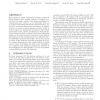Free Online Productivity Tools
i2Speak
i2Symbol
i2OCR
iTex2Img
iWeb2Print
iWeb2Shot
i2Type
iPdf2Split
iPdf2Merge
i2Bopomofo
i2Arabic
i2Style
i2Image
i2PDF
iLatex2Rtf
Sci2ools
SIGMETRICS
2006
ACM
2006
ACM
Fluid modeling of pollution proliferation in P2P networks
P2P systems are highly vulnerable to pollution attacks in which attackers inject multiple versions of corrupted content into the system, which is then further proliferated by unsuspecting users. However, to our knowledge, there are no closed-form solutions that describe this phenomenon, nor are there models that describe how the injection of multiple versions of corrupted content impacts a clients’ ability to receive a valid copy. In this paper we develop a suite of fluid models that model pollution proliferation in P2P systems. These fluid models lead to systems of non-linear differential equations. We obtain closed-form solutions for the differential equations; for the remaining models, we efficiently solve the differential equations numerically. The models capture a variety of user behaviors, including propensity for popular versions, abandonment after repeated failure to obtain a good version, freeloading, and local version blacklisting. Our analysis reveals intelligent str...
Related Content
| Added | 14 Jun 2010 |
| Updated | 14 Jun 2010 |
| Type | Conference |
| Year | 2006 |
| Where | SIGMETRICS |
| Authors | Rakesh Kumar, David D. Yao, Amitabha Bagchi, Keith W. Ross, Dan Rubenstein |
Comments (0)

